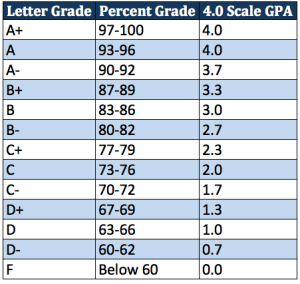Because knowledge is power, there’s arguably no better way to spend your summer than learning new information or a new skill.
Learning about an interesting subject can help you improve in your major, standout in your internship, discover a new hobby, and grow as a well-rounded individual.
And when an interviewer says, “I know it’s not your major, but do you have any experience in (insert skill),” you can answer, “Actually I do. I took an online course on it.” Then you’ll win the job offer for being the applicant that goes above and beyond the job requirements.
Plus, this is most likely your only shot to say you studied at an Ivy League school (without lying) if you take an online course from Yale or Princeton, for example.
Bottom line, there are plenty of advantages from taking an online course on your own time. So if you want to expand your horizons or brush up on a previous skill, free online courses are the way to go.
I believe most of you would agree that spending time learning over the summer is beneficial. But the same people probably don’t do it because they don’t want to pay for it or don’t know where to get this training from home.
To remove all excuses, I created a list of free online learning sites that you can take from the comfort of your home. All you need to do is make an account, sometimes not even that, and you’re instantly allowed access to these amazing courses.
Remember, all of these classes are free. One month of Netflix costs more. So there’s no risk!
Let’s check out the options.
1. Coursera
Coursera advertises for users to “take the world’s best courses, online” and they don’t fail to deliver. Their extensive catalog includes specialized courses in business, computer science, data, personal development and more. What makes Coursera special is they partner with top universities and organizations to provide free online learning. Some colleges they partner with include Duke, Johns Hopkins, Michigan, Penn, and other elite institutions.
2. Harvard Extension
The Harvard Extension is exclusive to Harvard classes and the name itself implies excellence. There’s no more prestigious university on the planet, and somehow you’re allowed to get at least part of a Harvard education for free. While this list highlights free online courses, the Harvard Extension also has 700 for-credit courses available to paying students. Check with your university’s registrar to see if the credit hours will transfer before paying for a summer class. If you do decide to take a class here, all I have to say is, “Welcome to Harvard,” even if you never visit the physical campus.
3. Khan Academy
Named after Gengis Khan, just kidding, but Khan Academy is one of the most popular online resources out there. Don’t let the grade school and SAT lessons fool you, college students can get stumped by college lessons in differential equations, linear algebra, and calculus. For those going to grad school, Khan even offers MCAT and GMAT courses. I personally appreciate Khan Academy’s pledge to always be free, and it doesn’t hurt when their interface has great form and function.
4. edX
Gain skills for your resume or LinkedIn by taking an edX course through a partnership with a top university. EdX offers 950+ courses in math, humanities, and computer science based on their partnerships with colleges like Harvard, Boston, MIT, Dartmouth, Cornell, Georgetown, and Caltech. It’s just another incredible website to expand your subject knowledge during the summer break.
5. Stanford Online
As beautiful as it is on Stanford’s Palo Alto campus, you can get a similar education on the couch with your computer through Stanford Online. These courses run the gamut from Cryptography and General Game Playing, to Stem Cell Therapeutics and Genomics and Other Omics. Stanford Online doesn’t disappoint and its only weakness may be that it doesn’t offer the same multitude of courses as a bigger site with multiple university partnerships.
6. Open Yale Courses
More Ivy League courses, this time from Yale, for free? That’s ridiculous, but it’s true. Open Yale Courses provides introductory classes taught by professors at Yale University. These courses were recorded live in a Yale Classroom, so you’re getting a 100% virtual experience. You can choose to get the lectures by video, audio, or text transcripts. My advice is be ready to focus.
7. Udemy
You can learn new knowledge at your own pace with any device on Udemy. This educational platform offers a unique feature that lets you build your own course based on the lessons. Since Udemy offers a combination of free and paid content, be sure it has a green “Free” at the bottom right of the feature image before registering.
8. Codecademy
If you weren’t tipped off by the name, Codecademy teaches people strictly how to code! With over 25 million people around the world practicing coding with them, it’s safe to assume they have a quality user experience. Maybe Codecademy’s best feature is it’s live practice window that allows you to try coding in a side window during the lesson. It’s also easy to see your progress and how much you’ve learned on this site. Practice enough, and it won’t be out of the question for you to transfer your coding skills into a website business in college, and take the profits to pay for graduate school.
9. Ted-Ed
I’m sure you’ve all watched at least one motivational, inspiring, and breathtaking TED Talk. But I bet you haven’t visited Ted-Ed to take their educational videos, quizzes, and extra materials. Once on the site, you can start by clicking the Student Level tab and then selecting College/University. The nice part is all the videos are 10 minutes or less, so you can cover a large amount of ground compared to other courses on this list that take months to complete. Think of these as bite-sized videos for the intellectually curious. (Totally unrelated by the way, one of my personal goals is to give a TED Talk before I turn 30.)
10. Academic Earth
Academic Earth has you covered if you’re looking for art and design, business, engineering, humanities, medicine and healthcare, science and math, social science, or test preparation. Basically, no matter what subject you need, Academic Earth has it! A small positive on this site is the option to search for subjects by school—like Princeton. Many other sites only allow searches by subject. The schools and the lessons alike are top-notch.
11. iTunes U
iTunes isn’t all about music and movies. The Apple giant offers free education for anyone with an iPhone, iPad, or iPod (doesn’t work for Android or Google devices). Through podcasts and videos, users can get a high quality education after browsing by university, subject, most downloaded, and noteworthy courses. iTunes U isn’t heavily publicized compared to other Apple products, but you would be wise to take advantage of this program.
12. University of Oxford Podcasts
One of the oldest and most elite universities in the world, the University of Oxford, publishes free podcasts for the benefit of international education. The podcast usually comes from a lecture series from a professor or guest professor. And it’s convenient that the audio comes in a series of episodes, say 10 episodes per series, for users to listen to on their own time. I find podcasts are best when driving on the road.
13. OpenCulture
OpenCulture provides 12,000 free online courses that you can download straight to your computer. I love OpenCulture because they pull a ton of resources from universities across the country and the world—England, Iceland, Australia—all to one place for easy user access. And these aren’t courses from any universities they can find. It’s Harvard, Oxford, Columbia, Cambridge, Notre Dame, and those elite institutions. Again, these lessons cost as much as it does to breathe.
14. MIT OpenCourseWare
One symbol of this resource’s quality is that around 60,000 people use MIT OpenCourseWare every day. Where some colleges only share a limited number of online material, MIT says it publishes virtually all MIT course content online. That’s to the tune of 2,340 courses! Meaning you’re going to have a hard time trying to find a course you want that MIT doesn’t offer. And on a previous Take Your Success post, I interviewed my cousin about her MIT experience.
15. Alison
Less extensive of a resource than others, Alison does provide a ton of value if you’re looking to gain skills in business, digital literacy, personal development, languages, health and safety compliance, and financial courses. It does offer certification, which can come in handy if you’re reporting your progress to a manager or need training for an entry-level job. As you know, a certificate is more official than a screen saying you passed the online course.
16. Carnegie Mellon Open Learning Initiative
The Carnegie Mellon courses come in less quantity than other resources, but the quality is up to par or better than the rest. Open Learning Initiative offers targeted feedback to direct you through the course with key insights. So you’ll soon know if your brain is getting all the course material or having trouble misunderstanding. And that’s why these free lessons are as good as it gets even in the standards of a paid-course.
17. Code
Code teaches coding lessons that range from ages 6 to 106. For example, their Star Wars-, Minecraft-, and Angry Birds- themed courses teach coding in an entertaining format. Since coding can be difficult, inserting some enjoyment to lighten things up is a nice touch. The categories go by learn an hour of code, beyond an hour, find local schools + camps, and code studio.
18. Memrise
If you’re looking to learn a new language for the sake of it or because you’re planning on studying abroad, Memrise is for you. This app (for iOS and Android) and website offers high quality courses in 200+ languages. Memrise essentially offers any language you can imagine. They also go the extra step to add games to their lessons and there’s another option to compete against your friends. Knowledge and competition at the same time will keep my attention.
19. UC Berkeley Class Central
Class Central gives you Berkeley courses for free, which saves you around $35,000 or more considering the cost of courses plus room and board on campus. Granted you don’t get the credits or the degree, but this is high-value anyway you slice it. Their online catalog has a new feature that I haven’t seen on the other universities, a rating system from one to five stars. Then when you click on the number of reviews, you can read what previous students thought about the course. That’s helpful to know what classes are worth your time. (Fun fact: My dog’s name is Berkeley.)
20. LessonPaths
Although some of the math and subjects are elementary (speaking to the course on multiplication), many of the courses are college-level. LessonPaths allows visitors to browse their courses by top playlists and top tags. That’s why lessons are easy to find without much digging. Thank you for that!
21. Spreeder
This isn’t a typical online resource with multiple course topics, because Spreeder only focuses on reading speed. It preaches that by cutting out the inner voice people use to read, they can significantly improve their reading time. I know that reading quicker can shave off 30 minutes or more from your class reading to make you more productive. Or if you read too slow that it takes you months to finish reading a book, Spreeder can also fix that pain with their free courses. And since time is the most valuable resource in the world, it’s a good idea to improve your reading speed so you can move on to other activities.
Final Words
Wow, after reading this list a logical question is can you skip college altogether and solely learn from the free online learning websites above? Ideally yes, and you could save tens of thousands of dollars doing it.
But the way society works, most people need the college degree to get started in their career and advance. I honestly wish it weren’t that way.
Anyway, whatever your subject focus is, I have no doubt you can improve your skills with an online course from one of the sites above. Those resources and their free price tag are still shocking to me.
Then when you come back to school in the fall, you’ll be confident that you made the most of your summer. You’ll also feel ahead of your peers who let their brain go to mush watching reruns of The Office.
Circling all the way back, remember knowledge is power. The Office trivia knowledge? Not so much.
What free online course are you most excited about? I’m going to start with Spreeder because of how many blog posts, articles, and books I read each week. Feel free to comment below with your thoughts and questions.




Thanks for providing the resources Brian! I’ve been looking to become certified in Microsoft Office, and I’m sure one of these websites has it for free.
Alison has exactly what you’re looking for: https://alison.com/learn/microsoft-office!
Thanks so much!